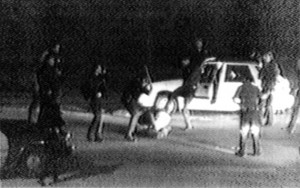“Good Kid” is the first track on “Good Kid, m.A.A.d City” to discuss gang and police violence as well as Compton’s drug culture. The track is sequenced with the song “m.A.A.d City” which builds off and develops the ideas on “Good Kid.” Lamar’s tone on “Good Kid” is much more manic compared to other tracks on the album. The hook describes Lamar’s outlook on Compton’s violence and drug culture as a “mass hallucination,” where the Compton experience is one of murkiness and ambiguity. Lamar is conscience of these absurd structures, understanding that they repress his ability to think clearly: “Look inside these walls and you see I’m having withdraws / Of a prisoner on his way trapped inside your desire / To fire bullets that stray…” Violence and drugs have distorted Lamar’s reality and constructed psychological boundaries that limit him to live autonomously.
Violence in Compton is perpetuated by gangs and police corruption. Thus, there are two spheres of violence Lamar faces that complicate his reality. Lamar on “Good Kid’ details his harassment by members of the Crips and Bloods, violent rival gangs in South Central Los Angeles whose blue and red colors resemble the blue and red of police sirens. While Lamar uses two separate verses to describe his experiences with gang and police violence the blue and red motif allows him to conflate these two spheres of violence as one holistic experience. The end of the first verse refers to Compton’s gang culture and states, “But what am I supposed to do when the topic is red or blue / And you understand that I ain’t, but know I’m accustomed to,” while the end of the second verse references police corruption and claims, “But what am I supposed to do with the blinking of red and blue / Flash from the top of your roof and your dog has to say woof.” The verse that deals with police violence, however, assumes Lamar must have some sort of gang affiliation to be a citizen of Compton: “And you ask, ‘Lift up your shirt’ cause you wonder if a tattoo of affiliation can make it a pleasure to put me through / Gang files, but that don’t matter because the matter is racial profile.” This line reveals a severe challenge Lamar experiences in Compton. While he disapproves Crips and Bloods’ violence, their actions have to come represent a larger narrative among policemen that associate gang violence with black male identity. Therefore, because of Lamar’s blackness he is immediately assumed to be a suspicious and potentially violent figure.

Lamar’s psychological boundaries are further complicated by Compton’s drug culture. Drugs act as a coping mechanism to the violence Lamar experiences. Lamar, at the end of “Good Kid,” states “When violence is the rhythm, inspired me to obtain / The silence in this room with 20’s, Xannies and ‘shrooms.” The substances that reorder Lamar’s psychological boundaries are superficial and illustrate an individual who is unable to use their own agency to remove these structures. Lamar, however, is aware of this deficiency when he claims “The streets sure to release the worst side of my best,” knowing that these structures eliminate his ability to identify himself and have the autonomy to do so. Substance abuse does not reinforce these psychosomatic borders but, rather, illustrate Lamar’s inability to correctly address internal structures that are altered by social forces. This idea contradicts Stiff Little Fingers “Here We are Nowhere,” which states that individuals take the agency to effect their space and bodies utilizing the punk ethos. Lamar, unfortunately, is a jaded, internally inept individual who is self-consciously aware of the identity Compton proscribes to him. Lamar’s experiences with violence and drugs, opposed to Stiff Littler Fingers contempt for boredom, have left him in a much heavier and more complicated state of oppression.
[If you would like to refresh your interactive experience please pinback to the songs.]
